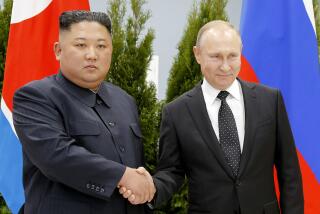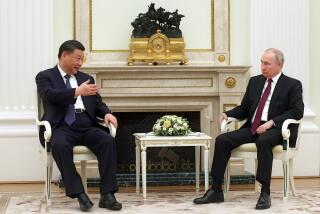Plans to Begin for Sino-Soviet Summit in 1989
- Share via
MOSCOW — Chinese Foreign Minister Qian Qichen said here Saturday that preparations will begin shortly for the first Sino-Soviet summit in 30 years, although the two countries still have differences over Cambodia and other crucial issues.
Qian said that his visit, the first by a Chinese foreign minister to Moscow since 1957, would “initiate the process of normalization between the two countries” after years of rivalry, hostility and even armed clashes along their border.
“Both sides want to hold such a (summit) meeting,” Qian told a press conference. “We should start preparing efforts to organize the meeting in the first half of next year.”
But Qian added, “There are some outstanding issues which necessitate further discussion. For that reason, I have invited my counterpart, Eduard Shevardnadze, to visit China early next year to continue our discussions.”
Shevardnadze, the Soviet foreign minister, later told the official Tass news agency that both countries are pleased with the recent improvement in their relations and want “complete normalization . . . (and) an atmosphere of trust.”
For nearly a decade, China has maintained that there could be no real improvement in relations with the Soviet Union until Moscow removed the “three obstacles” to better ties by reducing its military deployments along their border and in neighboring Mongolia, by withdrawing its forces from Afghanistan, which also borders China, and by ensuring an end to the Vietnamese intervention in Cambodia.
But Qian deftly avoided any suggestion that the summit, expected in April, was conditional--even when asked if China would proceed with the meeting if Vietnamese troops were still in Cambodia.
Soviet President Mikhail S. Gorbachev had “clearly expressed the view that it is possible to resolve the Kampuchean (Cambodian) problem,” Qian said, implying that China had received what it regarded as acceptable Soviet assurances of a Vietnamese withdrawal from Cambodia, perhaps by the end of 1989.
“Some Vietnamese say that normalization of Sino-Soviet relations will help the Cambodian problem, but they do not want to tackle the Cambodian problem head on,” he continued. “Vietnam should see that Cambodia is not a bargaining chip for them, but a hot potato--and they should get rid of it.”
Back Rival Groups
Beijing and Moscow have backed rival Communist groups in Cambodia--China has supported the Khmer Rouge, which held power from 1975 until ousted by Vietnamese forces in 1979 and replaced by a pro-Hanoi group.
While it has continued to insist on the Vietnamese withdrawal, China has also indicated its willingness to end its military support of the Khmer Rouge during a Vietnamese withdrawal as a way of encouraging a political settlement of the conflict.
Vietnam, which had an estimated 100,000 to 120,000 troops in Cambodia at the beginning of the year, has committed itself to the withdrawal of 50,000 troops by the end of this year and the remaining troops by the end of 1990.
China has rejected this timetable as too slow and questioned Vietnam’s sincerity in pledging the withdrawal, but Gorbachev told Qian on Friday that he believes Vietnam is showing “a constructive spirit” toward resolving the dispute, Tass reported.
Discernible Progress
There has been more discernible progress on China’s two other requirements for improved relations with Moscow.
Negotiations have settled disputes over large parts of their 2,600-mile border, and Moscow has pulled back a number of top-class combat units from the frontier and Mongolia.
Shevardnadze said he and Qian had discussed ways to reduce military confrontation and possible confidence-building measures that could be taken.
Half of the 100,300 troops that the Soviet Union said it had in Afghanistan were withdrawn on schedule, and the rest are due to leave by Feb. 15 under an agreement signed by Afghanistan and Pakistan and guaranteed by the Soviet Union and the United States. But Moscow has suspended its pullout and warned that its troops might remain if attacks by Muslim rebels escalate and the peace agreement collapses.
Acknowledging continuing differences on Cambodia and other issues, Qian remarked, “It would be amazing if we did not have differences.
‘Narrow Those Differences’
“That is why we discuss questions on which we have different opinions, and we try to narrow those differences. But, yes, there are differences.”
Qian--who studied here in the 1950s, came back as a Chinese diplomat in the 1970s and returned again in the early 1980s to open the dialogue with Moscow--was nevertheless upbeat after his three days of talks with Gorbachev and Shevardnadze.
“This signifies a start of a multifaceted normalization of relations between our two countries,” Qian said.
The “new relationship” envisaged by both countries, he continued, would end their prolonged confrontation but would not be a return to the closeness of the 1950s.
“It is necessary not to go back to the period of the 1950s,” Qian added, “but it is also necessary not to return to confrontation.”
Qian said that he and Shevardnadze had also discussed increased economic cooperation, including the expansion of border trade, joint ventures in manufacturing, cooperation in developing local resources and the use of Chinese workers in the Soviet Union.
More to Read
Sign up for Essential California
The most important California stories and recommendations in your inbox every morning.
You may occasionally receive promotional content from the Los Angeles Times.













